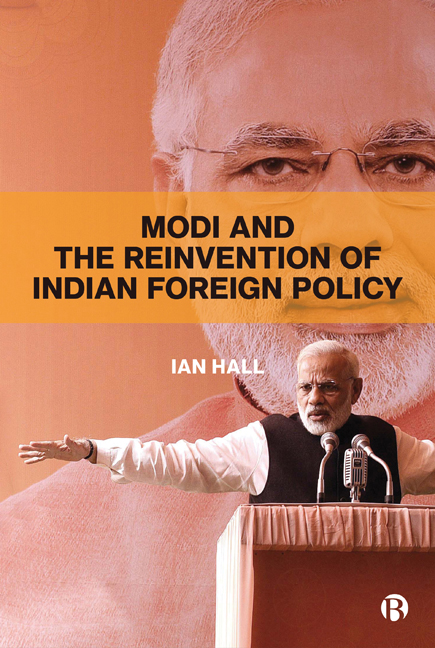Book contents
- Frontmatter
- Contents
- Abbreviations
- Glossary
- Notes on the Author
- Acknowledgements
- Preface
- 1 Introduction
- 2 Nonalignment to Multialignment
- 3 Hindu Nationalism and Foreign Policy
- 4 Modi and Moditva
- 5 World Guru India
- 6 Prosperity and Connectivity
- 7 National Power and Regional Security
- 8 Conclusion
- Notes
- References
- Index
- Frontmatter
- Contents
- Abbreviations
- Glossary
- Notes on the Author
- Acknowledgements
- Preface
- 1 Introduction
- 2 Nonalignment to Multialignment
- 3 Hindu Nationalism and Foreign Policy
- 4 Modi and Moditva
- 5 World Guru India
- 6 Prosperity and Connectivity
- 7 National Power and Regional Security
- 8 Conclusion
- Notes
- References
- Index
Summary
In late May 2019, Narendra Modi defied political gravity, and the expectations of many analysts, by emerging from a keenly contested election campaign with an even bigger majority than he had had before. His victory was hailed in the Indian media as a ‘TsuNaMo’ – an allusion to both the ‘Modi wave’ that had carried him into office in May 2014, and one of the Prime Minister's popular nicknames, ‘NaMo’ (Kohli, 2019). It confirmed Modi as the dominant political force of contemporary India, a figure lauded by millions and feared by many. His crushing win demonstrated not just his capacity to craft narratives of mass appeal, but also the success of his effort to re-craft his image since first coming to power – to make himself more than a mere politician, using foreign policy as one of the means to that end.
The general election that originally swept Modi and his Hindu nationalist Bharatiya Janata Party (Indian People's Party or BJP) into office in May 2014 was one of the most extraordinary episodes in Indian political history. Never before had so many Indians – over 814 million – been eligible to vote, and so many gone to the polls, on a turnout of just over 66 per cent. Never before had so much money been spent in the campaign – more than US$5 billion, according to one credible estimate (Kapur and Vaishnav, 2018, p. 4). And never before had the BJP won an outright majority in the Lok Sabha, the lower house of parliament, let alone the 336 seats out of 543 that it, along with its coalition partners, came to control. The Congress Party – which had dominated India's politics in the postcolonial era – was outpaced and outspent, and left with just 44 members of parliament (MPs).
At the centre of the election was Narendra Modi, the BJP's designated candidate for the post of Prime Minister, and one of the most successful and controversial figures in contemporary India. Born in 1950 into a relatively poor family, Modi rose to prominence through the ranks of the equally controversial Hindu nationalist movement, the Rashtriya Swayamsevak Sangh (loosely, the National Volunteer Association – the RSS) and then, in the 1980s and 1990s, through those of the BJP, for which he worked as a fixer, strategist and spokesperson.
- Type
- Chapter
- Information
- Modi and the Reinvention of Indian Foreign Policy , pp. 1 - 20Publisher: Bristol University PressPrint publication year: 2019



